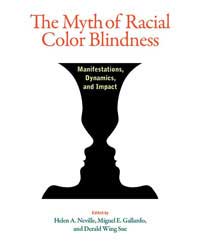 320 pages
320 pages9 CE credits
Course Enrollment
$210.00
Add to Cart
All exams are taken online. The exam for this course will be available in "My Courses" immediately upon enrollment. Note the book is not included.
The book is available for purchase from Amazon.
As an Amazon Associate we receive a rebate from qualifying purchases.
THE MYTH OF RACIAL COLOR BLINDNESS
Manifestations, Dynamics, and Impact
Helen A. Neville, Ph.D, Miguel E. Gallardo, Ph.D, and Derald Wing Sui, Ph.DAmerican Psychological Association, 2015
DESCRIPTION
Is the United States today a "post-racial" society? Some might point to the election and re-election of a Black president as conclusive evidence of the progress made in race relations, but others are not so sanguine. In this volume, top scholars in psychology, education, sociology, and related fields dissect the concept of color-blind racial ideology (CBRI), the widely-held belief that skin color does not affect interpersonal interactions, and that interpersonal and institutional racism therefore no longer exists in American society.
Contributors survey the theoretical and empirical literature on racial color-blindness; discuss novel ways of assessing and measuring color-blind racial beliefs; examine related characteristics such as lack of empathy (among Whites) and internalized racism (among people of color); and assess the impact of CBRI in education, the workplace, and health care as well as the racial disparities that such beliefs help foster. Finally, they recommend ways to counter color-blind racial beliefs by advocating for and implementing race-conscious policies and practices that aim to create equal access and opportunities for all.
The reader will be able to:
• Explore the reasons behind the belief that race is no longer important
• Demonstrate how this belief is used to continue racism
• Identify the opposition of the myth of color blindness and multiculturalism
• Critique color-blind racial research methods in social psychology
• Explain the measurement of color-blind racial ideology
• Use ethnography and interviews for gaining perspectives
• Demonstrate the findings of what a lack of empathy gives rise to
• Raise awareness of color-blind ideologies
• Choose ideologies to apply to therapy, counseling, and supervision
AUTHOR
Helen A. Neville, PhD, is a professor of educational psychology and African American studies at the University of Illinois at Urbana Champaign, who's won multiple awards, including from the APA and the Association of Black Psychologists.
Miguel E. Gallardo, PsyD, is an associate professor of psychology and director of Aliento, The Center for Latina/Latino Communities at Pepperdine University. He is currently director of research and evaluation for the Multiethnic Collaborative of Community Agencies, a nonprofit organization dedicated to serving monolingual Arab, Farsi, Korean, Vietnamese, and Spanish-speaking communities.
Derald Wing Sue, PhD, is professor of psychology and Education in the Department of Counseling and Clinical Psychology at Teachers College and the School of Social Work, Columbia University.
ISHK CE at Home
1702-L Meridian Ave., #266
San Jose, CA 95125-5586
This website uses cookies to ensure you get the best experience on our website. Learn more
